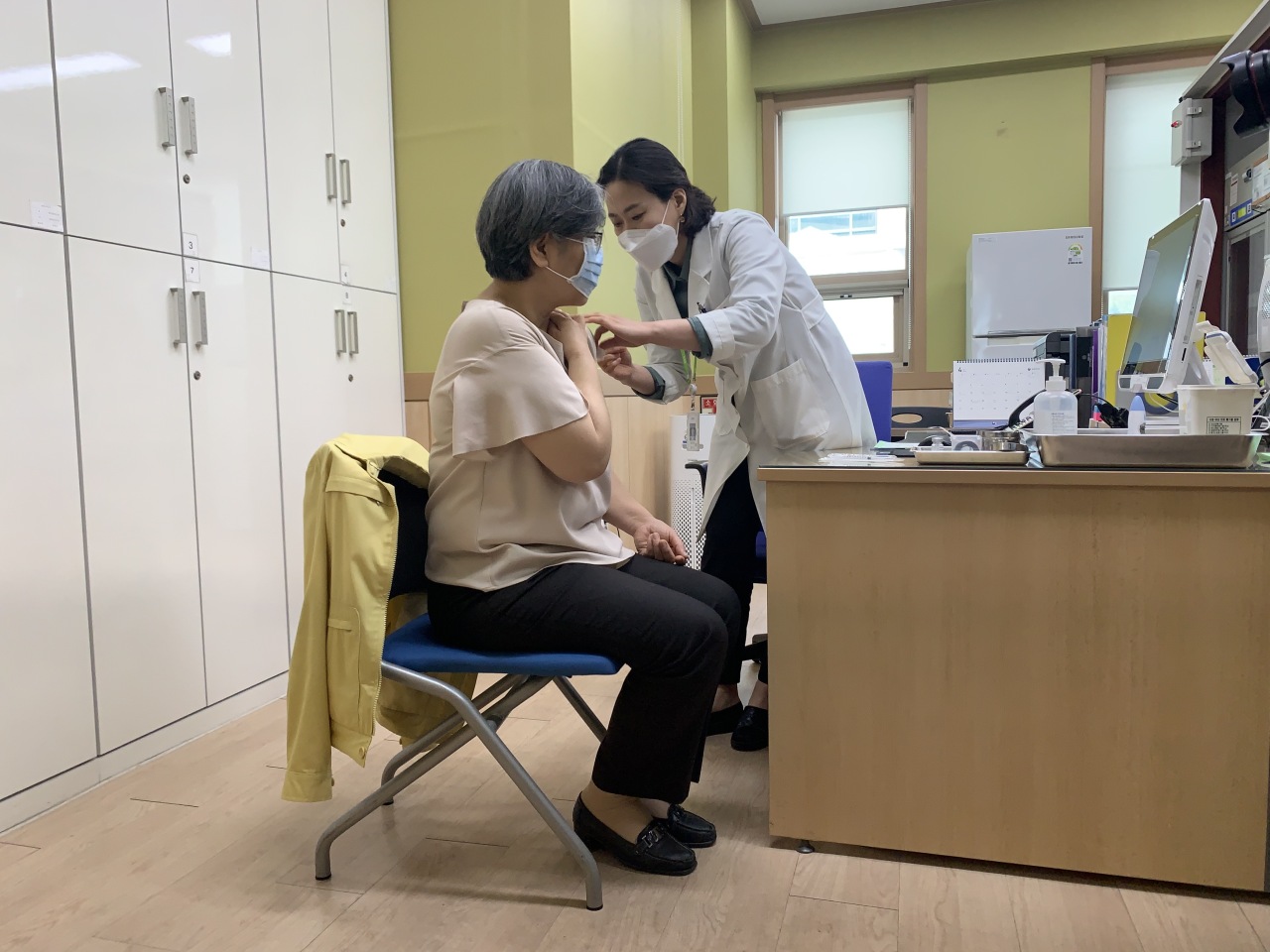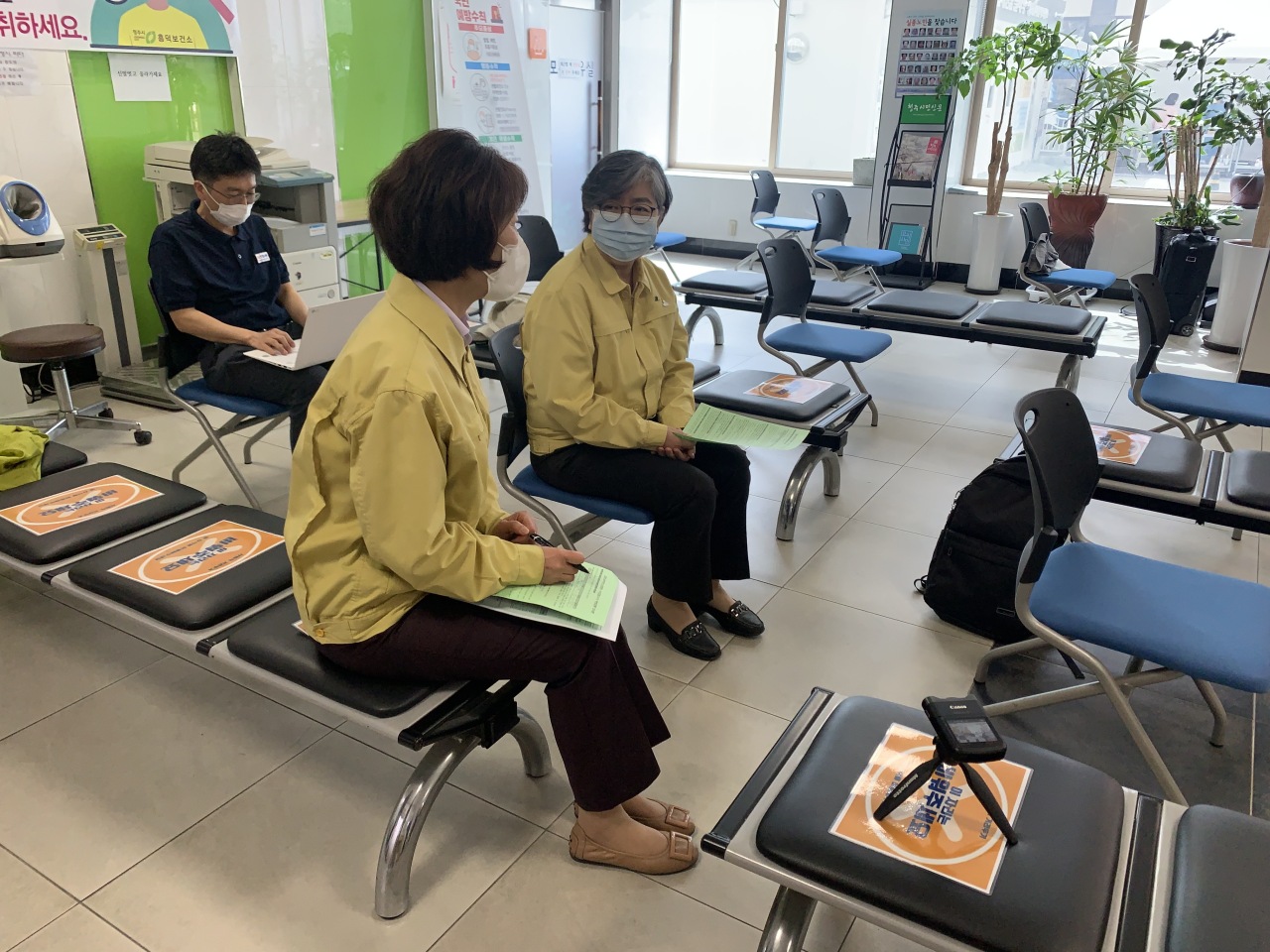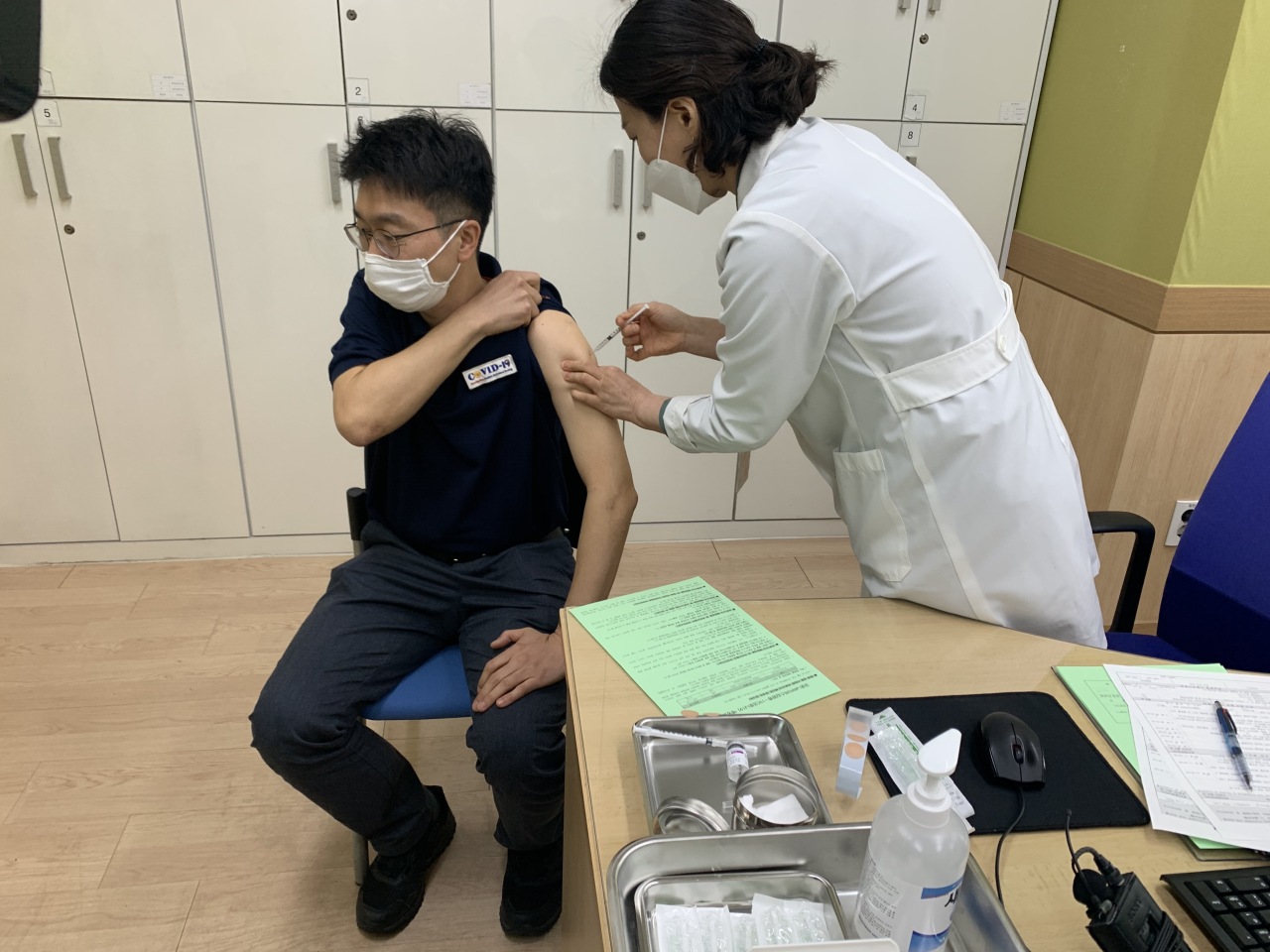 |
KDCA Commissioner Jeong Eun-kyeong receives her first dose of AstraZeneca’s COVID-19 vaccine Thursday morning at a public health center in Cheongju, North Chungcheong Province. (Kim Arin/The Korea Herald) |
CHEONGJU, North Chungcheong Province -- AstraZeneca vaccinations will continue for all age groups here for the time being, South Korea’s top pandemic response coordinator said as she received her first dose of the vaccine Thursday.
Korea Disease Control and Prevention Agency Commissioner Jeong Eun-kyeong got AstraZeneca’s COVID-19 vaccine at a public health center in Cheongju, North Chungcheong Province, home to the agency’s headquarters.
Jeong told reporters she had gotten “plenty of rest” the day before to be in a fit state to get vaccinated -- a moment she had looked forward to.
“While mask wearing and social distancing continue, there is no doubt vaccines are our surest way out of the pandemic,” she said, noting that Korea is now seeing over 500 new cases a day. “I urge everyone to get the vaccine when their turn arrives, not only for yourself but for your loved ones and neighbors.”
From filling out her consent form to a brief interview with a doctor to the shot finally being delivered into her arm, the whole process took around 15 minutes.
In a fact sheet the vaccination center provided to Jeong prior to her shot were instructions for contacting or visiting the nearest emergency room for any allergic reactions. People with fevers higher than 39 degrees Celsius or other symptoms that are debilitating enough to disrupt daily activities are advised to consult a doctor.
She wore short sleeves under the coat that she took off before the shot went into her left arm.
“It doesn’t hurt one bit,” she told the nurse.
To the nurse warning of symptoms such as fever, fatigue and aches that may occur in the next few days, Jeong replied, “I’m not too worried about it myself. But for younger people, their experience might be different.”
“This jab can be more painful than regular flu vaccines for some people,” the nurse agreed.
Jeong was careful not to dismiss the high rates of unpleasant side effects among younger recipients of the AstraZeneca jab.
“I think for younger people the aftereffects appear to be stronger,” she said, adding that some staff at the agency felt ill after vaccination and had to take time off.
The age association with the amount and severity of reactions came up several times in conversation.
Jeong told newly vaccinated people in the waiting area to have pain relievers and fever reducers ready in case they began to feel sick. The over-the-counter medication she recommended was acetaminophen, better known by the brand name Tylenol. Another piece of advice was to stay well rested and hydrated over the following couple of days.
The agency’s head of contact tracing, Park Young-joon, received his first AstraZeneca shot around the same time. He said he also had pain medicine ready for possible side effects.
Jeong stayed for roughly 20 minutes as she was monitored for any reactions before she was able to leave.
In response to queries from reporters afterward, Jeong said that although some countries are halting the AstraZeneca vaccine’s use in younger people, Korea will not be following suit.
“I’m well aware that people are worried about the rare blood clotting events reported after AstraZeneca vaccinations overseas,” she said. “Korea also had one such recipient in his 20s who developed blood clots in the brain, which is still being investigated. But that’s one case out of over 800,000 people who have had the vaccine here.”
Medical regulators in countries like France, Canada and Germany have decided to only give the vaccine to older adults after reports of unusual blood disorders in people aged 55 or younger, especially women. Jeong, 55, falls in the potentially at-risk bracket.
“I hope that my getting the AstraZeneca vaccine today can help soothe concerns people may have.”
She went on, “The World Health Organization continues to recommend the vaccine’s use, as does the European Medicines Agency. I don’t believe that the recent developments are enough reason to tweak our vaccination plans.”
The second phase of Korea’s mass vaccination campaign is starting this week for people 75 or older and non-COVID-19 essential workers such as early childhood educators, police and firefighters. Pfizer jabs are going to the elderly, while the rest are given AstraZeneca’s.
As for delays in vaccine supplies affecting the administration of second doses, she said the two-dose regimen may be forgone to maximize the number of people who are given at least a first dose. “There are studies that suggest a single dose offers reasonable levels of protection,” she explained.
Asked if Korea would be able to vaccinate 12 million people before July, as laid out in the plan earlier, she said “there will be more arriving in the third quarter.”
Korea will have access to some 7 million doses of the AstraZeneca vaccine and 7 million more doses from Pfizer sometime in May or June, she said, although the specific dates are not fixed. For Johnson & Johnson, Moderna and Novavax vaccines, however, their likelihood of being delivered in time appears murkier, she added.
“The intervals between two AstraZeneca vaccine doses are quite long at between eight and 12 weeks, so I anticipate we will have enough to give people their second shots in summer,” she said. “I expect to get my second dose no later than 12 weeks from now, per the guidelines.”
 |
KDCA Commissioner Jeong Eun-kyeong speaks with the public health center’s director while she is observed for possible adverse reactions after getting the shot. (Kim Arin/The Korea Herald) |
 |
KDCA’s head of contact tracing Park Young-joon receives an AstraZeneca shot in his left arm at a Cheongju, North Chungcheong Province, public health center Thursday morning. (Kim Arin/The Korea Herald) |








![[Exclusive] Hyundai Mobis eyes closer ties with BYD](http://res.heraldm.com/phpwas/restmb_idxmake.php?idx=644&simg=/content/image/2024/11/25/20241125050044_0.jpg)
![[Herald Interview] 'Trump will use tariffs as first line of defense for American manufacturing'](http://res.heraldm.com/phpwas/restmb_idxmake.php?idx=644&simg=/content/image/2024/11/26/20241126050017_0.jpg)
![[Herald Review] 'Gangnam B-Side' combines social realism with masterful suspense, performance](http://res.heraldm.com/phpwas/restmb_idxmake.php?idx=644&simg=/content/image/2024/11/25/20241125050072_0.jpg)